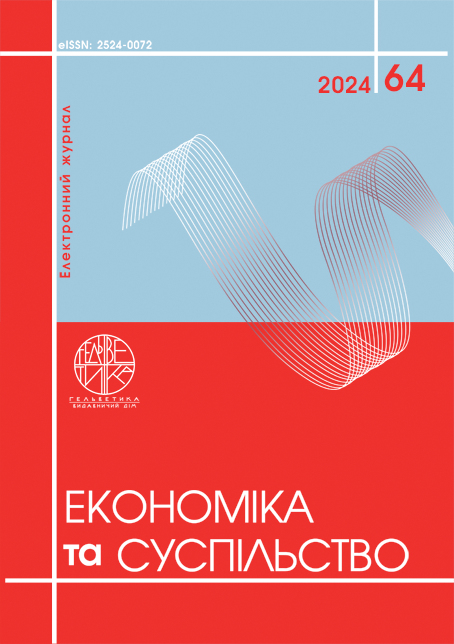АКТУАЛЬНІ ПИТАННЯ РЕФОРМУВАННЯ ПОЛІТИК І ПРАКТИК МВФ ТА СВІТОВОГО БАНКУ
Анотація
У статті досліджено вплив факторів глобальної нестабільності на зміну практик і політик МВФ та Світового банку. Ключовими факторами, що спонукають до зміни офіційної риторики програм та реальної практики МВФ та Світового банку виступають загострення глобальних викликів нерівності, боргового обтяження бідніших країн, уповільнення економічного зростання, фрагментація світової економіки, зміна клімату, потреби посилення потенціалу економічного зростання замість фінансової стабілізації. Дані виклики обумовили переоцінку відповідності стандартизованих програм МВФ та проектів розвитку Світового банку. Визначено, що МВФ та СБ мають низку важливих інструментів, які можуть бути використані для вирішення означених претензій і посилення інституційної ролі цих інституцій на сучасному етапі глобальних трансформацій. Для Україні доцільно продовжувати співпрацю з цією групою, обґрунтувавши конкретні побажання щодо більш перспективних форм і напрямів фінансування.
Посилання
Güven A. Defending supremacy: how the IMF and the World Bank navigate the challenge of rising powers. International Affairs. 2017. Т. 93. № 5. P. 1149–1166.
Clift B. The IMF and the Politics of Austerity in the Wake of the Global Financial Crisis. Oxford University Press. 2018. 26 p.
Arauz A. New IMF Trust Shows the Path Toward SDR Rechanneling Through Development Banks. Washington, DC: Center for Economic and Policy Research. 2022. 30 April. URL: https://cepr.net/new-imf-trust-shows-the-path-toward-sdr-rechanneling-throughdevelopment-banks/
Proczek M. IMF Activity Supporting International Financial Stability and Sustainable Development. Global Public Goods and Sustainable Development in the Practice of International Organizations. 2023. P. 211–231.
Broome A. Back to basics: The great recession and the narrowing of IMF policy advice. Governance, 2015. Т. 28. № 2. P. 147–65.
Mottley M. The IMF Must Lead on Debt Sustainability. Finance & Development. June 2024. P. 40–42.
Ray R., Gallagher K., Kring W. (2020). IMF austerity since the global financial crisis: New data, same trend, and similar determinants. Boston University Global Development Center, GEGI Working Paper. 2020. № 11. 43 p.
Garicano, L., & Lastra, R. M. (2010). Towards a new architecture for financial stability: Seven principles. Journal of International Economic Law. 2020. Т. 13. № 3. P. 597–621.
Truman E. The IMF should enhance the role of SDRs to strengthen the international monetary system. Peterson Institute for International Economics Working Paper. 2022. № 22–20. 46 p.
Pforr T., Pape F., Murau S. After the allocation: what role for the Special Drawing Rights system? Institute for New Economic Thinking Working Paper Series. 2022. №. 180. URL: https://papers.ssrn.com/sol3/papers.cfm?abstract_id=4063198
Науменкова С., Міщенко С. Інноваційні інструменти зеленого фінансування для України. Економічний простір. 2024. № 189. С. 291–299.
Бублик Є.О. Фінансова відкритість транзитивних економік. Київ : НАН України; Ін-т. екон. та прогнозув., 2020. 324 с.
Global economic prospects 2024. World Bank Report. 2024. January. 230 p.
Ukraine: Fourth Review of the Extended Arrangement under the Extended Fund Facility, Request for Modifications of a Performance Criterion and Financing. IMF. Country Report 2024. № 24/199. URL: https://www.imf.org/-/media/Files/Publications/CR/2024/English/1ukrea2024002-print-pdf.ashx
Міністерство фінансів України. Новини. Офіційний сайт. 2024. 31 травня URL: https://www.kmu.gov.ua/news/predstavnyky-vlady-ukrainy-ta-mvf-dosiahly-domovlenosti-na-rivni-ekspertiv-shchodo-chetvertoho-perehliadu-prohramy-mekhanizmu-rozshyrenoho-finansuvannia-eff
2021 Special Drawing Rights Allocation – Ex-Post Assessment Report. IMF. 2023. URL: https://www.elibrary.imf.org/view/journals/007/2023/035/article-A001-en.xml
Güven, A.B. (2017). Defending supremacy: how the IMF and the World Bank navigate the challenge of rising powers. International Affairs, 93(5), 1149–1166.
Clift, B. (2018). The IMF and the Politics of Austerity in the Wake of the Global Financial Crisis. Oxford University Press.
Arauz, A. (2022). New IMF Trust Shows the Path Toward SDR Rechanneling Through Development Banks. Washington, DC: Center for Economic and Policy Research, April 30. Available at: https://cepr.net/new-imf-trust-shows-the-path-toward-sdr-rechanneling-throughdevelopment-banks/
Proczek, M. (2023). IMF Activity Supporting International Financial Stability and Sustainable Development. Global Public Goods and Sustainable Development in the Practice of International Organizations, 211–231.
Broome A. (2015). Back to basics: The great recession and the narrowing of IMF policy advice. Governance, 28(2): 147–65.
Mottley, M. A. (2024). The IMF Must Lead on Debt Sustainability. Finance & Development. June. 40–42.
Ray, R., Gallagher, K. P., & Kring, W. N. (2020). IMF austerity since the global financial crisis: New data, same trend, and similar determinants. Boston University Global Development Center, GEGI Working Paper, 11/2020. 1–43.
Garicano, L., & Lastra, R. M. (2010). Towards a new architecture for financial stability: Seven principles. Journal of International Economic Law, 13(3): 597–621.
Truman, E. M. (2022). The IMF should enhance the role of SDRs to strengthen the international monetary system. Peterson Institute for International Economics Working Paper, Nr. 22-20, December. 1–46.
Pforr, T., Pape, F., & Murau, S. (2022). After the allocation: what role for the Special Drawing Rights system?. Institute for New Economic Thinking Working Paper Series, Nr. 180. Available at: https://papers.ssrn.com/sol3/papers.cfm?abstract_id=4063198
Naumenkova S. & Mishchenko S. (2024). Innovative green financing tools for Ukraine. Economic scope. 189(2024): 291–299.
Bublyk, Y. (2020). Financial openness of transition economies. Institute of the Economy and Forecasting of the National Academy of Sciences of Ukraine, 324.
World Bank (2024). Global economic prospects 2024. World Bank Report. January. 230 p.
IMF (2024). Ukraine: Fourth Review of the Extended Arrangement under the Extended Fund Facility, Request for Modifications of a Performance Criterion and Financing. IMF Country Report Nr. 24/199. Available at: https://www.imf.org/-/media/Files/Publications/CR/2024/English/1ukrea2024002-print-pdf.ashx
Ministry of Finance of Ukraine. (2024). News. Official website. May, 31. Available at: https://www.kmu.gov.ua/news/predstavnyky-vlady-ukrainy-ta-mvf-dosiahly-domovlenosti-na-rivni-ekspertiv-shchodo-chetvertoho-perehliadu-prohramy-mekhanizmu-rozshyrenoho-finansuvannia-eff
IMF (2023). 2021 Special Drawing Rights Allocation – Ex-Post Assessment Report. Available at: https://www.elibrary.imf.org/view/journals/007/2023/035/article-A001-en.xml

Ця робота ліцензується відповідно до Creative Commons Attribution 4.0 International License.


